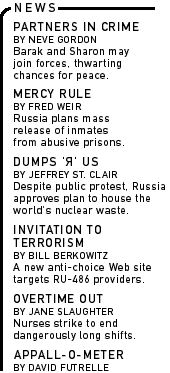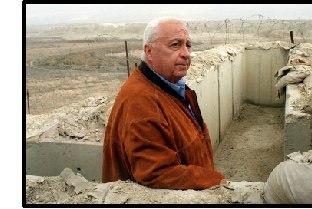

|

|

|

|
| |
|
|
|
The first Ehud Barak-Ariel Sharon alliance began in 1982. At the time, Barak was a young general in charge of strategic development; in this capacity he prepared a detailed proposal for the invasion of Lebanon. He handed the plan to Sharon, the defense minister, who launched the attack a few months later. The results were horrific. An estimated 20,000 Lebanese civilians died--including hundreds of Palestinians massacred in Sabra and Shatila; hundreds of thousands were wounded and displaced; Israel's death toll was more than 1,000. Nineteen years later, it looks like the Barak-Sharon duo is preparing a comeback. Polls show Sharon heading for an easy victory in the February 6 elections with a 20 percent lead over Barak. Aware of the Knesset's problematic configuration, however, Sharon has declared his intention to create a national unity government in which Barak will be defense minister--a move that may serve to deflect an unfavorable international reaction to Sharon's government. Whether the two candidates will actually join forces remains a matter of speculation.
For those who have not followed Sharon's career it is important to note that his criminal record did not begin with the Lebanon fiasco, but can be traced back to 1953 when the military unit he commanded attacked El-Bureig refugee camp in the Gaza Strip. An estimated 50 refugees were killed in that operation. A few months later, the same unit carried out a massacre in the Jordanian village of Qibya. U.N. observers who arrived at the scene stated that the "bullet-riddled bodies near the doorways, and multiple bullet-hits on the doors of the demolished houses indicated that the inhabitants had been forced to remain inside until their homes were blown up over them." According to Prime Minister David Ben-Gurion's biography, "70 corpses were found in the rubble, including dozens of women and children." As the military commander of Gaza during the '70s, Sharon introduced new methods of brutal repression. Unfortunately, neither these atrocities nor the Sabra and Shatila debacle put an end to his career, and today a war criminal is running for Israel's highest office. While Barak's history is not as appalling, in the past few months he has gone a long way toward catching up. After defeating Netanyahu, he introduced two taboo issues into Israel's public discourse--Jerusalem's division and Palestinian refugees' "right of return." In this way, Barak actually contributed to the peace effort. Yet it is crucial to consider not only what Barak has said, but what he has done. As Edmund Burke once wrote, in politics conduct is the only language that rarely lies. During Barak's short year-and-a-half tenure, Jewish settlers in the Palestinian territories have built as many houses as they did under his right-wing predecessor, Benjamin Netanyahu. When Rabin and Arafat signed the Oslo agreement in 1993, there were 110,000 Jewish settlers; this number has almost doubled. The construction of bypass roads also has dramatically increased. Given that the Oslo agreement is based on the principle of land for peace, the accelerated construction in the territories is a major obstacle. The settlement build-up and the ongoing confiscation of land is the backdrop for the second Intifada. As In These Times went to press, 360 people had been killed in the occupied territories since September 29, while more than 11,000 have been wounded. The Palestinians have buried 288 people (80 of whom were under the age of 17), and the Israelis 37; four foreign nationals were also killed. Barak has instructed commando units to carry out summary executions. The latest victim of this policy was Dr. Thabet Thabet, who was well known to Peace Now activists for organizing joint political activities as well as dialogue groups between Israelis and Palestinians. No one knows exactly why he was targeted. As if the destruction of life were not enough, Barak also has attacked the Palestinians' livelihood. At the outset, he ordered the military to implement a curfew on the residents of downtown Hebron. For almost four months, the houses of 37,000 Palestinians have been turned into prison cells so that a few hundred Jewish zealots can live out their fundamentalist aspirations. In other Palestinian cities and villages, hundreds of thousands of people are prevented from reaching their workplaces due to the hermetic military siege. The Gaza Strip has been divided into three sealed zones, and in some isolated villages unemployment rates have soared to 70 percent. Acres of orchards and fields have been destroyed, thousands of olive trees uprooted and hundreds of houses demolished. The grinding poverty is so severe that people are beginning to run out of food and medicine. Barak strangles and dehumanizes the Palestinian people while continuously stating that he will do everything in his power to bring peace. Perhaps the most bizarre part of the upcoming elections is that both generals are running on the "peace" ticket. Nearly every slogan in Sharon's campaign includes the term; one cannot drive along Israel's highways without noticing billboards declaring "Sharon will lead Israel to peace." All this is reminiscent of Orwell's chilling political world where "Newspeak," the official language introduced by the government, facilitates the manipulation of the population. Despite the well-oiled propaganda machine, many citizens have not
been fooled. They recognize an impossible situation and consider
the limited choice between two Napoleons as a dangerous restriction
of the democratic process. According to current polls, unless a
miracle occurs and Barak reaches a peace agreement, more than 20
percent of the electorate will either cast a blank ballot or not
vote at all. This has created considerable pressure within the Labor
Party, and rumors have it that Barak may quit the race, allowing
Shimon Peres to take his place. Be that as it may, a tragedy is
unfolding with no end in sight. Regardless of the election results,
the near future will likely be bloody. Neve Gordon teaches in the department of politics and government at Ben-Gurion University, Israel.
|


